Agrovegetal has developed a variety of proteinaceous peas that are resistant to powdery mildew and won’t require fungicidal treatments. The company is dedicated to obtaining and developing new varieties of certified seeds of extensive crops and will soon register this important novelty in the legume segment that will help improve crop rotation in Andalusia.
“Five years ago, when we were looking for varieties of peas that had resistance to powdery mildew, we found two varieties of Central European origin and we began to cross them with the most cultivated varieties here. All these crosses led to the emergence of seeds that respond to what we have been demanding,” stated the director of Agrovegetal, Ignacio Solis.
Getting to this point has taken the company nearly five years, producing two generations per year, as the varieties have to be self-bred at least ten times to have a new pure line that can be placed in the market. After conducting the registration procedures, the company will carry out official trials for at least two years. Thus, they hope to start selling seeds of this new pea in 2024.
The results in the field trials carried out by Agrovegetal have been very satisfactory. As a result, the company hopes to be able to increase the nearly 15,000 hectares of peas there are in Andalusia. The scarce implantation in the cultivation of peas in the autonomous community is due to the incidence of fungi (such as powdery mildew) and parasites (such as jopo) that have been reducing production, and to the fact that the varieties being planted up to now are of French origin and not very well adapted to the Andalusian climate, Solis stated.
Crop rotation
With this new variety, the company expects an increase in pea plantings, which is a very favorable choice for crop rotation. Until now, the vast majority of farmers rotate cereal with sunflower or canola. “However, all experts recommend adding a legume. The options available were chickpeas or beans. Now, peas will be a third viable option,” Solis added.
A decade of research
For the past decade, the Agrovegetal Council, which is made up of the Campo de Tejada, Coesagro, San Dionisio, Cerealistas de Conil, Los Remedios-Picasat, SAT Cordoba, and Cocereales cooperatives, has placed emphasis on promoting research in legumes: chickpeas, broad beans, and peas.
Source: sevilla.abc.es


